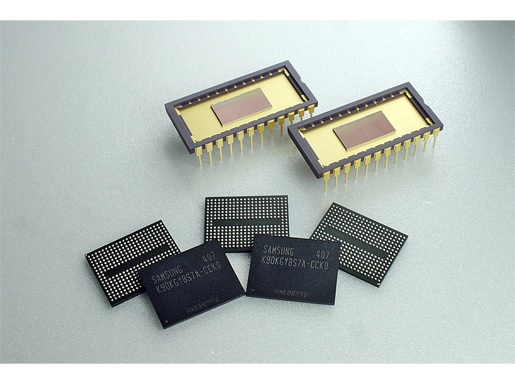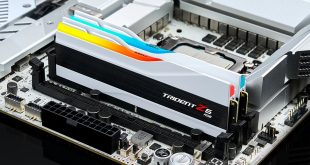Samsung Electronics plans to wed triple-level cell NAND flash technology with vertical stacking of NAND flash memory. The new type of NAND will be very cost-efficient to manufacture, which will help Samsung to decrease pricing of its solid-state storage solutions, such as memory cards, storage modules, solid-state drives and so on.
Manufacturers of NAND flash are always looking for ways to increase bit density of their memory amid growing demand for solid-state storage. One of the ways to boost bit density is to increase the amount of bits stored by every NAND flash cell, but that decreases write endurance of memory. At present NAND makers can cram up to three bits into one cell; such memory type is called triple-level cell (TLC) NAND. Another way is to stack numerous layers of NAND flash vertically; this type of memory is called 3D V-NAND. The latter is usually faster and provides better write endurance than planar NAND flash made using 10nm- or 20nm-class process technologies.
While there are no technical problems of uniting the TLC and the 3D V-NAND technologies, no memory maker has so far revealed such plans. However, last week during the Q&A session of its SSD Global Summit in Seoul, South Korea, Samsung unveiled that it planned to make an announcement related to three-bit 3D V-NAND, claims the TechReport.
Samsung did not say when it plans to wed the TLC and the 3D V-NAND technologies. Previously it was expected that Samsung will increase the number of layers within its 3D V-NAND chips from 24 or 32 today to 48 in late 2015 – 2016. However, it looks like the company plans to become even more aggressive and release TLC V-NAND in the coming years as well.
Keeping in mind that Samsung is the only maker of 3D V-NAND memory at present and its rivals are not going to start to produce 32-layer NAND flash memory for quite some time, it is unclear why the South Korean maker needs TLC 3D V-NAND. While such memory is rather complex to produce, it may improve performance and write endurance of traditional TLC since stacked NAND is not made using the latest and thinnest process technologies.
Discuss on our Facebook page, HERE.
KitGuru Says: The main question now is when Samsung plans to roll-out its TLC 3D V-NAND memory. If such memory is indeed scheduled to arrive within one year from now, then the company will have an ultimate weapon against its rivals…
 KitGuru KitGuru.net – Tech News | Hardware News | Hardware Reviews | IOS | Mobile | Gaming | Graphics Cards
KitGuru KitGuru.net – Tech News | Hardware News | Hardware Reviews | IOS | Mobile | Gaming | Graphics Cards



